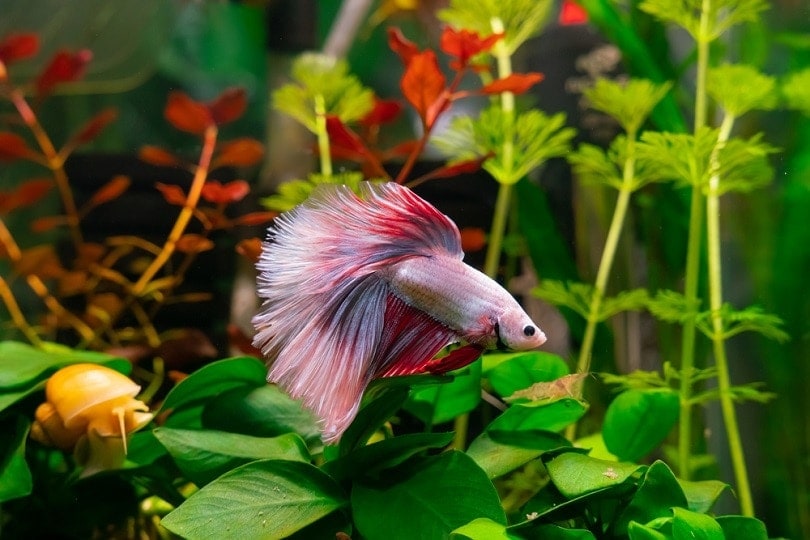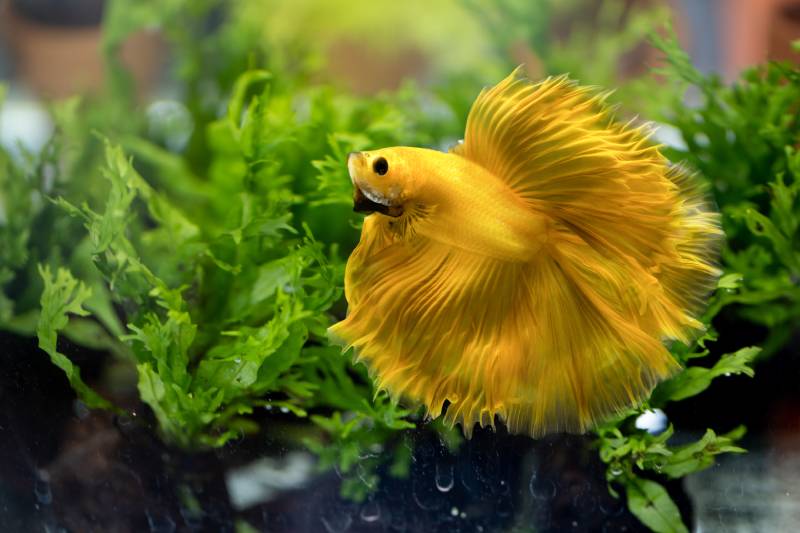Goldfish vs Betta Fish: The Differences (With Pictures)

Updated on
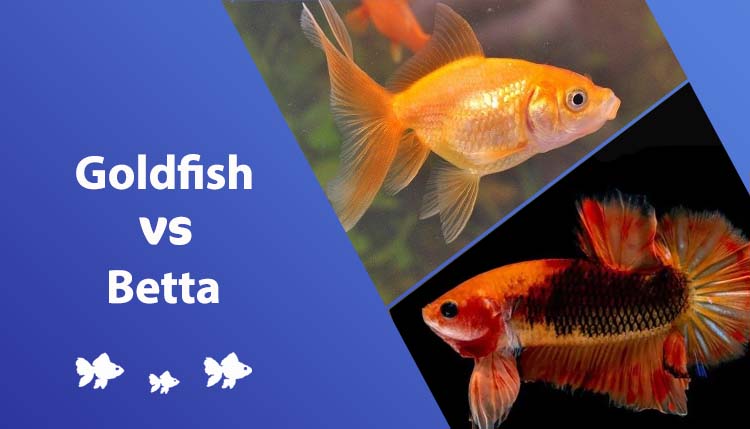
The world of fish can be vast and intimidating, so many people find a good starting point with two of the most common and widely available fish, the goldfish and the betta fish. Both of these fish are available at most pet stores, even in small towns and rural areas. Common goldfish usually are less expensive than betta fish, generally selling for less than $1 while bettas sell for $5 and up depending on color and variety.
Bettas and Common goldfish are hardy, making them good choices for people new to fish keeping, but they have quite different needs that should be considered when deciding which type of fish to take home. So, let’s weigh the pros and cons of goldfish versus betta fish!
Visual Differences

At a Glance
- Average length (adult): 10–12 inches, up to 16 inches
- Average lifespan: 10–15 years, up to 40 years
- Diet: Pellets, flakes, gel food
- Water parameters: 65–75˚F, pH 7.0–8.4, 0 nitrates, nitrites, and ammonia
- Care level: Easy
- Temperament: Peaceful; Will eat any fish or invertebrates they can fit in their mouths
- Colors and patterns: Orange, red, yellow, white, black, grey, silver; Single, bi-, or tri-color in combinations except calico
- Average length (adult): 25-2.6 inches, up to 3 inches
- Average lifespan: 3–5 years, up to 10 years
- Diet: Betta specific pellets or flakes
- Water parameters: 75–81˚F, pH 6.5–7.5, nitrates <20-40ppm, 0 nitrites and ammonia
- Care level: Easy
- Temperament: Aggressive toward other Bettas; may be indifferent in community tanks with peaceful tankmates like dull-colored guppies, African dwarf frogs, ghost shrimp, tetras, and snails
- Colors and patterns: Dozens of single, bi-, and tri-color varieties can be shades of black, white, blue, orange, red, chocolate, copper, pink, purple, yellow, green, turquoise, and albino; scales can be metallic, opaque, or translucent

Goldfish Overview
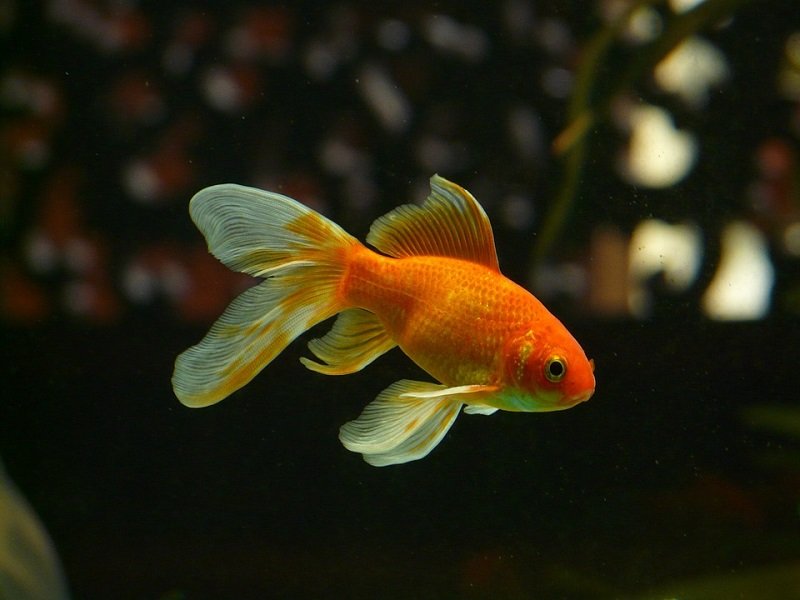
Tank Needs
Contrary to popular belief, a fishbowl is not a good long-term living situation for goldfish. On the other side of that, the idea that goldfish require a gallon per inch of fish length or a minimum of 50 gallons for one goldfish doesn’t really hold water either. They do best with good filtration due to their heavy bioload in the environment and while they can survive poor quality water with low oxygen concentration due to their ability to breathe surface water, they thrive in clean conditions with gently moving water.
More fish in a smaller environment means more frequent water changes and close monitoring of water parameters. Goldfish prefer long, narrow tanks to round bowls or bow-front tanks. If they have adequate space to swim and clean water, goldfish can thrive. They love having live plants in their tank and will use them for grazing or hiding.
Behavior
Goldfish are generally very peaceful fish and as long as they are kept with other peaceful tankmates they can’t fit in their mouths, they usually get on fine with others. They are omnivorous, so caution should be taken when putting goldfish with livebearers or invertebrates since they will eat fry, eggs, snails, shrimp, and any other small tankmates.
During the breeding season, male goldfish can be rough with females and may require separation to prevent injury. Goldfish are intelligent and able to learn tricks. They can also identify people by voice and appearance and can differentiate colors, shapes, and sounds.
Diet
Goldfish flakes and pellets are widely available everywhere from pet stores to big box stores. More specialized foods like gel mixes are harder to find, usually only being available at locally owned pet stores or online. Flakes and pellets are formulated to meet the nutrition needs of goldfish and they technically do, but dietary supplementation is recommended for best health.
Providing vegetables, like arugula, herbs, lettuce, and broccoli, can prevent constipation and give goldfish something to graze on between meals. There are many fruits and vegetables that goldfish enjoy eating and experimentation to determine preferences can be a fun activity. Frozen, freeze-dried, and live marine proteins like brine shrimp and daphnia make a good treat and live foods can stimulate natural hunting instincts.
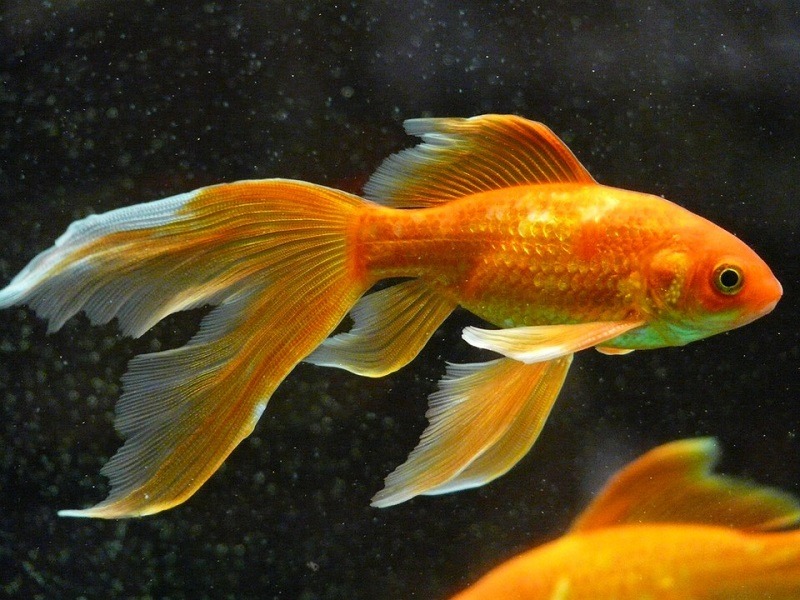
Other Considerations
Common goldfish can get large, usually around a foot in length, and can live to be 20 years old or more with good care. Startup goldfish care can be done for as little as $40 but depending on equipment and tank size can cost upwards of $100.
Suitable for:
Common goldfish are a good choice for first-time fish keepers due to their hardiness, versatility, and ease of care. They can live happily in ponds or aquariums alone or with tankmates, although many seem to prefer having another goldfish to keep them company. Their potential for large size and length of life means they should only be taken on by someone willing to make a long-term commitment to their care.
- Versatile and hardy
- Widely available
- Inexpensive startup
- Varied diet possibilities
- Peaceful, good candidates for community tanks
- Playful, intelligent
- Require frequent water changes or excellent filtration
- Long-term commitment
- Large size potential

Betta Fish Overview
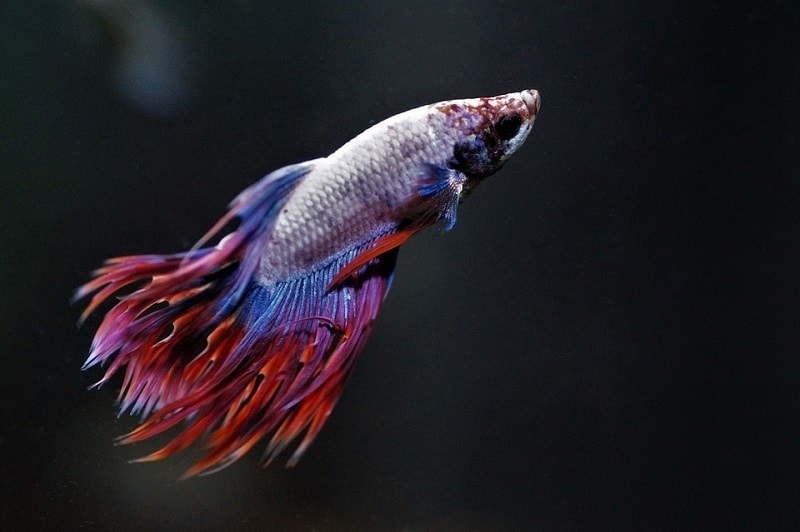
Tank Needs
While betta fish can be kept in relatively small tanks due to their small adult size, they cannot live exclusively on plant roots. Bettas are hardy and can live in poor water quality, preferring slightly acidic water, and can survive in water with low oxygen concentration. Like goldfish, bettas can breathe surface air to survive. They have a small bioload and do not require filtration, but it is best for water quality and maintaining parameters to provide filtration.
They can live in tanks as small as a gallon, but three gallons or more is recommended. Bettas like lots of plants and hiding spots and can become stressed without them.
Behavior
Betta fish are known for being aggressive, usually toward other bettas. This is most common in male-to-male interactions but can also apply to male-to-female and female-to-female interactions. Ideally, bettas should live alone. While they do not get lonely like some fish, they can live in community aquariums, usually somewhat indifferent to the other fish. It is best to only give bettas peaceful tankmates that meet their warm water needs.
Fish that nip should be avoided, as well as fish that may remind bettas of other bettas, like brightly colored mollies or even some varieties of guppies.
Diet
Bettas are carnivores and in the wild, betta fish have a diet high in protein from tiny fish, insect larvae, brine shrimp, and even insects that end up on or in the water. They get fiber from the other animals they eat, so they do not require roughage or plants to survive. Aside from the poor conditions, this is another reason why bettas should not be kept in containers with a plant on top to “feed” them. They cannot subsist on plant roots or any kind of minerals or nutrients from the plant.
Bettas can be fed a quarter of a softened, shelled pea, very small amounts of boiled or steamed veggies like zucchini, or washed and steamed roughage like spinach and lettuce to help resolve constipation.

Other Considerations
Most stores that sell betta fish, and even many that don’t, carry betta startup kits that include a small tank and all the initial equipment required for betta care. These kits often cost around $20–$40. Depending on the variety and color of betta chosen, the cost for the fish itself can exceed $20. Their lifespan makes them a much shorter-term commitment than goldfish, but they do still require adequate care for longevity and health.
Suitable for:
Bettas are a good option for new fish keepers because of their low maintenance care. Responsibility for water cleanliness and a healthy diet are still necessary, though. Bettas come in a rainbow of colors with beautiful, flowing fins, so they cut a striking image in a tank.
Although bettas still live in the wild today, pet betta fish should be kept indoors. They are poor candidates for pond life due to their small size and warm water preference. Like goldfish, bettas can be trained and learn to recognize specific humans.
- Hardy
- Beautiful appearance, dozens of colors and varieties
- Low bioload
- Simple dietary needs
- Inexpensive startup equipment
- Small adult size
- Intelligent
- Cannot share space with other bettas
- May make a poor tankmate in community tanks
- Some varieties can be pricy
- Short life expectancy
- Require plants and hides in tank to reduce stress

Which Breed is Right For You?
Betta fish and common goldfish are both excellent options for new and experienced fishkeepers alike. Both are intelligent and can learn to be social with humans, but goldfish are far more likely to be social in a community tank setting. Many people find goldfish unexciting in appearance, but bettas are colorful and eye-catching.
- Do you want one fish or multiple?
- Do you want a few years of commitment or a few decades of commitment?
- Do you want a compact fish or one you may have to purchase larger tanks for as it grows?
- Do you want to experiment with a varied diet and determine your fish’s likes and dislikes or do you want a fish with straightforward dietary needs?
All of these are important things to consider when choosing between a betta fish and a goldfish. Taking all this knowledge and your lifestyle, time, responsibility level, space, and aesthetic preferences into account should help you make the best decision for which type of fish suits your home.
Featured Image Credit: (L) Val Krasn, Shutterstock, (R) nicefishes, Pixabay
